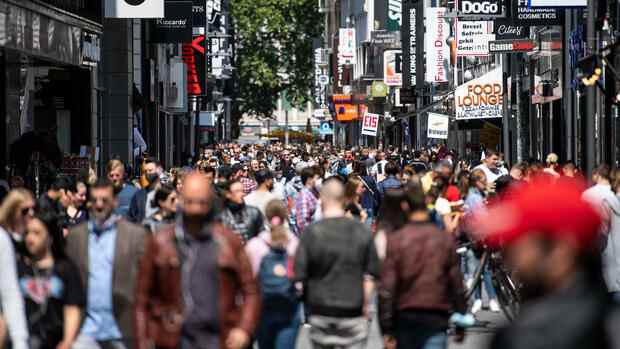The German retail sector can look back on a difficult first half of the year.
(Photo: dpa)
Berlin High inflation, corona crisis, Ukraine war: German retailers have ended an extraordinarily difficult first half of the year with the sharpest drop in sales in 28 years. Adjusted for inflation (in real terms), their income in June was 8.8 percent lower than a year earlier, the Federal Statistical Office announced on Monday. “This is the largest decline compared to the same month last year since the beginning of the time series in 1994,” it said.
In nominal terms – i.e. not price-adjusted – sales fell by only 0.8 percent. “The difference between the nominal and real results reflects the high price increases in retail, which are having a noticeable impact on consumer confidence,” the statisticians explained.
Economists predict tough times for retail to continue. “That wasn’t the last bad consumer news,” said the chief economist at Hauck Aufhäuser Lampe Privatbank AG, Alexander Krüger. “Because of the miserable consumer mood, the consumer star should continue to fall from now on. Consumers are struggling with serious real income losses.”
Most recently, the inflation rate was more than seven percent, the highest it has been in decades because energy prices have shot up as a result of the Ukraine war.
Top jobs of the day
Find the best jobs now and
be notified by email.
The gas levy – which for many Germans will mean a renewed price surge by autumn at the latest – is likely to curtail many consumer wishes this year. Economics Minister Robert Habeck put the additional costs at several hundred euros per household, which consumers will incur as a result of the levy and are then not available for shopping. “The low point in consumption is yet to come,” expects economist Krüger.
Consumer sentiment at a record low
The German Retail Association (HDE) assesses this in a very similar way. Its consumption barometer – which is based on a monthly survey of 1,600 people – fell to a record low in August.
“The strong downturn in consumer sentiment can be attributed in particular to the growing uncertainties in the energy supply and energy price development in recent weeks,” according to the industry association. “Against this background, consumer restraint is to be expected in the next three months.”
Compared to the previous month, there was also a decline in retail sales: Adjusted for inflation, revenue fell by 1.6 percent compared to May. That comes as a surprise: economists surveyed by the Reuters news agency had expected slight growth of 0.2 percent.
Consumers spent 1.6 percent less on groceries. “The decline is probably mainly due to the increased food prices,” according to the statisticians. Trade in textiles, clothing, shoes and leather goods was unable to continue the positive trend of the year to date and was 5.4 percent lower in June than in the previous month.
Internet and mail order business, which has been booming for a long time, also recorded a 3.8 percent drop in sales compared to the previous month. Compared to the same month last year, there was a minus of 15.1 percent, the biggest decline since 1994. Compared to June 2019, however, sales are still 22.3 percent above the level before the corona pandemic.
More: Despite the travel boom: Business at the airports is only slowly recovering
